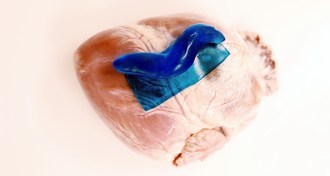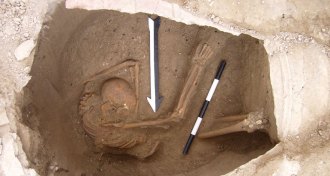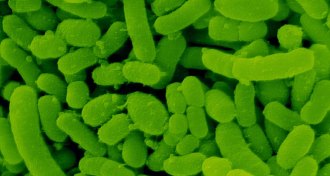Humans
Sign up for our newsletter
We summarize the week's scientific breakthroughs every Thursday.
-
 Health & Medicine
Health & MedicineNewborn baby’s infection offers a cautionary tale about placenta pills
A newborn came down with a dangerous bacterial infection. The culprit, scientists suspect, was contaminated placenta pills eaten by the mother.
-
 Materials Science
Materials ScienceSlug slime inspires a new type of surgical glue
A new glue that mimics a slug’s mucus secretions sticks well, even when wet. The adhesive could be used in place of sutures or staples in surgeries.
-
 Anthropology
AnthropologyAncient DNA offers clues to the Canaanites’ fate
DNA is painting a more detailed portrait of the ancient Canaanites, who have largely been studied through the secondhand accounts of their contemporaries.
-
 Anthropology
AnthropologyReaders question hominid family tree
Readers sent feedback on hominid origins, fast cameras, slimy sea creatures and more.
-
 Health & Medicine
Health & MedicineMost football players who donated their brains to science had traumatic injury
A self-selected sample of 202 deceased football players, the largest to date, finds that the majority suffered from chronic traumatic encephalopathy.
-
 Health & Medicine
Health & MedicineAdd penis bacteria to the list of HIV risk factors
Certain bacteria found on the penis raise the risk of HIV infection, a new study finds.
-
 Health & Medicine
Health & MedicineBaby-led weaning won’t necessarily ward off extra weight
Babies allowed to feed themselves gained similar amounts of weight as babies spoon-fed by caretakers.
-
 Health & Medicine
Health & MedicineCows produce powerful HIV antibodies
For the first time in any animal, researchers elicit broadly neutralizing antibodies against HIV. Cows’ antibodies could help with drug development.
-
 Archaeology
ArchaeologyHumans first settled in Australia as early as 65,000 years ago
Australia may have said “G’day” to humankind thousands of years earlier than previously believed.
-
 Health & Medicine
Health & MedicineCommon drugs help reverse signs of fetal alcohol syndrome in rats
A thyroid hormone and a blood sugar drug affect levels of a hormone needed for brain development, study in rats shows.
-
 Genetics
GeneticsDog domestication happened just once, ancient DNA study suggests
DNA of ancient canines counters idea that dogs were domesticated twice, in Europe and Asia.
-
 Archaeology
ArchaeologyCopper in Ötzi the Iceman’s ax came from surprisingly far away
Copper for the ancient Iceman’s blade traveled about 500 kilometers to his northern Italian home region.
By Bruce Bower